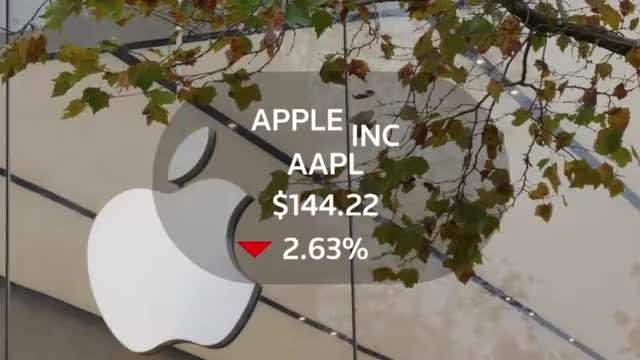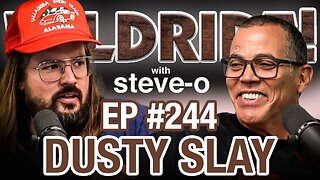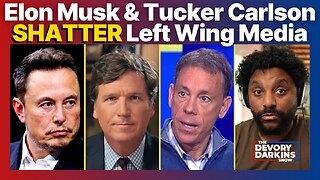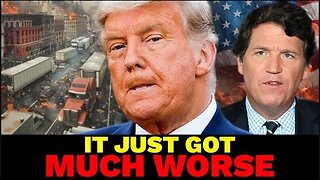Premium Only Content

Wall Street down sharply on Apple and China fears
https://www.febspot.com?ref=50177
Wall Street tumbled on Monday as protests in major Chinese cities against strict COVID-19 policies sparked concerns about the global economy.
Rare protests in major Chinese cities over the weekend against the country's strict zero-COVID curbs are exacerbating worries about growth in the world's second-largest economy.
The Dow Jones Industrial Average fell almost 500 points, dropping nearly one-and-a-half percent. The S&P 500 and the Nasdaq both dropped over one-point-five percent.
Apple shares fell $3.89, down more than two-point-six percent, dragging down the benchmark S&P 500 index as worker unrest at the world's biggest iPhone factory in China fanned fears of a deeper hit to the already constrained production of higher-end phones.
"I think you're going to see some real supply-chain issues..."
Greg Swenson is a founding partner at Brigg Macadam. "Apple's producing their iPhone 14 Pro and that's really going to have some effect because the manufacturing in Zhengzhou is going to be, the unrest is actually happening in the factory that makes these iPhones."
Mitigating those loses, shares of e-commerce behemoth Amazon.com rose nearly six-tenths of a percent after an industry report estimated spending on Cyber Monday, the biggest U.S. online shopping day, would climb as much as $11.6 billion.
Also sounding something of an optimistic note: John Williams, the New York Federal Reserve Bank president.
"I expect real GDP to increase only modestly this year, and in 2023."
Williams told the New York Economic Club that he saw the Fed maintaining it's policy of interest rate hikes to combat inflation, but said he was already seeing signs that the rate hikes were having the desired effect and did not forecast an economic recession.
"It will take some time, but I'm fully confident that we'll return to a sustained period of price stability."
[flash]
"The Fed has been wrong so much in the last two years, really the last five years."
Greg Swenson was far more pessimistic in his forecast, and expected inflation would not come down until unemployment climbed significantly higher.
"I think you're going to see the Fed continue to raise rates, cause unemployment to go higher, and that will result in some economic contraction, for sure."
This week, investors will keep a close watch on November consumer confidence data, due on Tuesday; the government's second estimate for third-quarter gross domestic product, due on Wednesday; and November's jobs report due on Friday.
-
 LIVE
LIVE
Price of Reason
10 hours agoMainstream Media FEARS Extinction! Gladiator 2 Review! New DnD SCANDAL!
3,902 watching -
 LIVE
LIVE
Fresh and Fit
6 hours agoIsrael-Hezbollah Ceasefire & Reacting To Death Threats On X
6,088 watching -
 1:11:10
1:11:10
Steve-O's Wild Ride! Podcast
5 days ago $7.11 earnedDusty Slay Went From Selling Pesticides To Having A Netflix Special - Wild Ride #244
21.1K3 -
 1:16:02
1:16:02
CocktailsConsoles
4 hours agoBE PART OF THE GAME!!| Death Road to Canada | Cocktails & Consoles Livestream
13.9K1 -
 LIVE
LIVE
Phyxicx
6 hours agoWe're streaming again! - 11/26/2024
211 watching -
 LIVE
LIVE
GamingWithHemp
6 hours agoHanging with Hemp #103
1,244 watching -
 21:24
21:24
DeVory Darkins
1 day ago $9.32 earnedElon Musk and Tucker Carlson SHATTER Left Wing Media
29.6K31 -
 15:13
15:13
Stephen Gardner
3 hours ago🔥Breaking: Trump JUST DID the UNEXPECTED | Tucker Carlson WARNS America!
25.5K59 -
 1:18:01
1:18:01
Glenn Greenwald
8 hours agoWill Trump's Second Term Promote Economic Populism? Matt Stoller On Cabinet Picks To Fight Corporate Power; Should Liberals Cut Off Pro-Trump Friends & Family? | SYSTEM UPDATE #372
166K141 -
 2:26:30
2:26:30
WeAreChange
9 hours agoTrump To Subdue Deranged Opposition! ARRESTS Planned
131K52